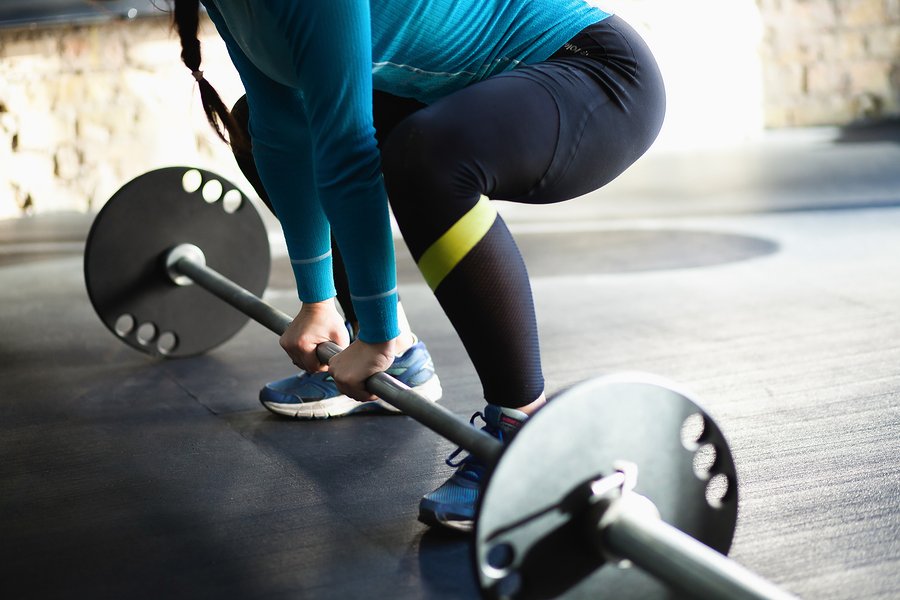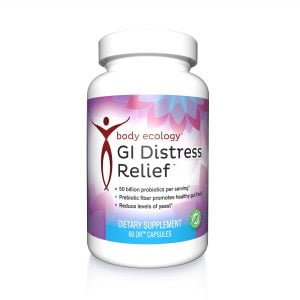
A must-read for athletes: Help for exercise burnout and weakened immunity
A 2011 study published in the Nutrition Journal revealed that competitive male cyclists using a probiotic supplement had a 50-percent decrease in symptoms of upper respiratory tract infection.
We all know regular exercise is good for us, but athletes fall within a different category — strenuous exercise may inflame the body.
When it comes to probiotics for athletes, a daily supplement, like Body Ecology’s GI Distress Relief, can be a prime supporter of immunity.
Probiotics for athletes: What does the research say?
The randomized control trial, conducted in 2011, took a sample of 99 people, 64 of which were male and 35 were female. They were all an average age of 35 years old and all competitive cyclists. For 11 weeks, participants were randomly assigned to receive either a placebo or a probiotic supplement.
The results:1
- The males in the study had a significant increase in L. fermentum taking up residence in the gastrointestinal tract, 7.7-fold, whereas female participants had an overall 2.2-fold increase in L. fermentum.
- Likewise, the males in the study revealed an overall decrease in upper and lower respiratory tract infection, and females saw no change or even an increase in lower respiratory illness, although a decrease in severity.
These results give us more insight into what researchers have been trying to explore for years: how probiotics for athletes impact performance.
In 2015, when researchers examined the clinical and physiological effects of probiotics for athletes, they confirmed that — because of probiotics’ ability to directly interact with gut microbiota — probiotics may interface with the immune system and influence immune signaling with organs and other systems in the body. Researchers also considered good gut health important to help the body adapt to exercise and physical activity.2
Getting into the habit of exercising from a young age can change gut bacteria for the better, improving metabolism and brain health over a lifetime.3
A 2014 study conducted in association with the Irish Rugby Football Union found that both exercise and diet can affect microbial diversity in the gut — athletes were found to have more diverse gut bacteria than the control group.4 High microbial diversity has been linked to good health.
Scientists have even investigated bacteria-rich bovine colostrum, similar to mother’s first milk, to use as a tool to reduce gut permeability, or leaky gut, in Olympic athletes. Another reason probiotics for athletes may be beneficial: Exercise-induced gut disorders, like leaky gut, are known to be especially common among runners.5
Looking for the right supplements to rev up your workout? Exercisers and athletes love our plant-based sports performance pack.
Here’s where the gut-brain connection comes in
While researchers in the original Nutrition Journal study concluded that more studies were needed to determine why there was a difference between genders, they did look at pro-inflammatory and anti-inflammatory cytokines as possibly being responsible for the variation.
Cytokines are small protein molecules that modulate the immune system:
- They are secreted by the glial cells of the nervous system and by immune cells.
- Cytokines are like messengers between cells that open up the lines of communication throughout the entire body.
- The gut, which comprises the enteric nervous system, has both glial cells and neurons, typically thought to correspond to only the central nervous system.
- This is why a severe and chronic inflammatory response in the gut often is linked to a permeable blood-brain barrier.
Brain fog, especially after eating an allergenic food, is one of the most common associations between the gut and the brain. An excited immune system with the release of pro-inflammatory cytokines that originate in the gut means the entire body goes on red alert. This is especially true of those tissues that are rich in glial and immune cells.
Cytokines are similar to hormones.
Sometimes, the effect of cytokine communication is systemic, rather than simply local and restricted to one area of the body. Some cytokines will actually trigger the release of other cytokines; for this reason, they are of particular interest in understanding autoimmune conditions and systemic inflammation.
Certain cytokines are considered biomarkers of systemic inflammation. These are:
- Interleukin 6 (IL-6)
- Tumor necrosis factor alpha (TNF-alpha)
- Interleukin 1-beta (IL-1-beta)
- C-reactive protein (CRP)
These biomarkers are associated with age-related diseases, such as diabetes and atherosclerosis. CRP has been strongly implicated in the development of atherosclerosis, as it shows up in coronary artery smooth muscle cells. Also, IL-6 and TNF-alpha have been found to activate CRP.
Interleukin-12 (IL-12) modulates the T helper cell 1 (Th1) and T helper cell 2 (Th2) responses and has been implicated in autoimmunity. It is also a precursor to TNF-alpha, a pro-inflammatory cytokine mentioned above. Interestingly, intestinal flora may enhance IL-12 production in the spleen.6
How exercise can impair inflammatory regulation
Several studies have found that while moderate exercise benefits the immune system, repeated strenuous exercise has been found to actually harm the cellular immune system and increase inflammation. This is because the body sees intense exercise as a physical stressor, impinging on immune cell function.
The answer is somewhere between the two:
- More than 20 years ago, University of Toronto researchers confirmed that light physical activity is enough to boost the immune system of people exercising for the first time.7
- In 2012, Loughborough University researchers delved deeper when they discovered that moderate exercise can reduce the risk of catching a cold-like infection, while strenuous exercise, like running a marathon, could make susceptibility to a cold worse.8
- As researchers learned during the pandemic, sticking to a regular, moderate exercise routine can positively impact the immune system — even in isolation.9
- Extreme exercise, on the other hand, might result in blood poisoning by causing bacteria to leak into the bloodstream, according to a 2015 study conducted by Monash University.10
The best way to approach exercise, as an athlete or everyday exerciser, is by giving your body the fuel it needs to move and compete.
Our vegan Probiotic Protein Shake offers probiotics for athletes, supporting energy, endurance, and gut health at all levels of activity. For daily probiotic protection needed for strenuous exercise, our GI Distress Relief is designed to relieve gut disorders — including gas, diarrhea, constipation, bloating, and stomach pain — while equipping the immune system to fight off infection.
When all else fails, don’t forget the Body Ecology Principles of Step-by-Step and Uniqueness. Approach each exercise one step at a time so that you don’t over-extend or over-stress your body. And with each physical challenge, remember that we’re all unique — a high-intensity exercise that works for one person may be damaging to another.
REFERENCES:
- 1. West NP, Pyne DB, Cripps AW, Hopkins WG, Eskesen DC, Jairath A, Christophersen CT, Conlon MA, Fricker PA. Lactobacillus fermentum (PCC®) supplementation and gastrointestinal and respiratory-tract illness symptoms: a randomised control trial in athletes. Nutr J. 2011 Apr 11;10:30. doi: 10.1186/1475-2891-10-30.
- 2. Eur J Sport Sci. 2015;15(1):63-72. doi: 10.1080/17461391.2014.971879. Epub 2014 Oct 23.
- 3. Agnieszka Mika, Monika Fleshner. Early life exercise may promote lasting brain and metabolic health through gut bacterial metabolites. Immunology and Cell Biology, 2015; DOI: 10.1038/icb.2015.113.
- 4. S. F. Clarke, E. F. Murphy, O. O’Sullivan, A. J. Lucey, M. Humphreys, A. Hogan, P. Hayes, M. O’Reilly, I. B. Jeffery, R. Wood-Martin, D. M. Kerins, E. Quigley, R. P. Ross, P. W. O’Toole, M. G. Molloy, E. Falvey, F. Shanahan, P. D. Cotter. Exercise and associated dietary extremes impact on gut microbial diversity. Gut, 2014; DOI: 10.1136/gutjnl-2013-306541.
- 5. Ray Playford et al. The nutriceutical, bovine colostrum, truncates the increase in gut permeability caused by heavy exercise in athletes. American Journal of Physiology-Gastrointestinal and Liver Physiology, March 2011.
- 6. The intestinal microflora regulates cytokine production positively in spleen-derived macrophages but negatively in bone marrow-derived macrophages. Eur Cytokine Netw. 1999 September; 10(3): 365-372. P Nicaise, A Gleizes, C Sandre, R Kergot, H Lebrec, F Forestier, and C Labarre.
- 7. Shephard RJ. How much physical activity is for good health? Int J Sports Med. 1999 Jan;20(1):23-7. doi: 10.1055/s-2007-971086.
- 8. Gleeson, Mike. Association for Science Education (ASE) Conference. Society for General Microbiology, 2012.
- 9. Richard J Simpson, John P Campbell, Maree Gleeson, Karsten Krüger, David C Nieman, David B Pyne, James E Turner, Neil P Walsh. Can Exercise Affect Immune Function to Increase Susceptibility to Infection? Exerc Immunol Rev, 2020.
- 10. S. Gill, J. Hankey, A. Wright, S. Marczak, K. Hemming, D. Allerton, P. Ansley-Robson, R. Costa. The Impact of a 24-h Ultra-Marathon on Circulatory Endotoxin and Cytokine Profile. International Journal of Sports Medicine, 2015; DOI: 10.1055/s-0034-1398535.









